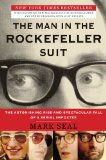Summary | Excerpt | Reading Guide | Reviews | Beyond the Book | Read-Alikes | Genres & Themes | Author Bio
The Astonishing Rise and Spectacular Fall of a Serial Imposter
by Mark Seal

Critics' Opinion:
Readers' Opinion:
First Published:
Jun 2011, 336 pages
Paperback:
Apr 2012, 336 pages
 Book Reviewed by:
Book Reviewed by:
Jo Perry
Buy This Book
This article relates to The Man in the Rockefeller Suit
You can't read The Man in the Rockefeller Suit without wondering if Rockefeller would have conned you too. While Seal notes that a few people failed to believe Rockefeller's stories or personas, the majority of people Gerhartstreiter met were more than happy to call the eccentric aristocrat friend, neighbor, business partner, club member, or even "uncle" and were generous with their time and money as well.
People in the business of detecting lies have offered various theories about how liars give themselves away. Widely recognized signs that a person is lying, such as shifty eyes, unusual speech patterns or inflections in the voice, awkward body language, and sweating, are all useful tools in identifying possible liars, however these "tells" aren't always reliable; they are often present in people who are nervous but also telling the truth.
In his blog for the Association for Psychological Science, Full Frontal Psychology, writer Wray Herbert notes that, "detecting deceit... is maddeningly difficult. Most of us can spot barely more than half of all lies and truths through listening and observation," and that, "a half-century of research has done little to polish this unimpressive track record."
But cognitive psychologists such as Aldert Vrij at the University of Portsmouth, UK are using one very valuable discovery to help change that. "The human mind... has limited capacity for how much thinking it can handle at any one time. So adding demands for additional, simultaneous thought - or cognitive 'load' - compromises normal information processing. What's more, lying is more cognitively demanding than telling the truth, so these compromised abilities should show up in detectable behavioral clues."
In an article entitled "Outsmarting the Liars: Toward a Cognitive Lie Detection Approach," Vrij suggests that liars can be outsmarted by making interview settings more stressful and/or by asking questions in ways that require more mental effort, which in turn produces "more cues to deceit." Vrij suggests that interviewees be asked to "tell their stories in reverse order" and to "instruct interviewees to maintain eye contact." He explains that, "When people have to concentrate on telling their stories - like when they are asked to recall what has happened - they are inclined to look away from their conversation partner... because maintaining eye contact is distracting." In this way, Vrij contends that by using this "strategic-questioning approach," scientists can better detect "the most differential respsonses between truth tellers and liars."
If you want to try your hand at lie detection, watch some of the uncut F.B.I. interview with Clark Rockefeller or scrutinize the images of him in the Boston Globe interview below, and see if you can detect any "cues to deceit."
Filed under Cultural Curiosities
![]() This "beyond the book article" relates to The Man in the Rockefeller Suit. It originally ran in June 2011 and has been updated for the
April 2012 paperback edition.
Go to magazine.
This "beyond the book article" relates to The Man in the Rockefeller Suit. It originally ran in June 2011 and has been updated for the
April 2012 paperback edition.
Go to magazine.




The less we know, the longer our explanations.
Click Here to find out who said this, as well as discovering other famous literary quotes!
Your guide toexceptional books
BookBrowse seeks out and recommends the best in contemporary fiction and nonfiction—books that not only engage and entertain but also deepen our understanding of ourselves and the world around us.